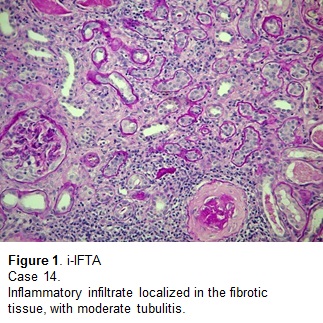Molecular Microscope Proves i-IFTA Lack of Specificity
1Warsaw Medical Univeristy, Warsaw, Poland, 2Department of Immunology, Transplantology and Internal Diseases, Warsaw Medical Univeristy, Warsaw, Poland, 3Gdansk Medical University, Gdansk, Poland, 4ATAGC, University of Alberta, Edmonton AB, AB, Canada, 5Pomeranian Medical University, Szczecin, Poland
Meeting: 2019 American Transplant Congress
Abstract number: A1
Keywords: Biopsy, Gene expression, Kidney, Rejection
Session Information
Session Name: Poster Session A: Acute Rejection
Session Type: Poster Session
Date: Saturday, June 1, 2019
Session Time: 5:30pm-7:30pm
 Presentation Time: 5:30pm-7:30pm
Presentation Time: 5:30pm-7:30pm
Location: Hall C & D
*Purpose: According to 2017 Banff classification, inflammatory infiltrate in the fibrotic renal tissue with at least moderate total inflammations score (ti≥2), and tubulitis (t≥2) should be interpreted as a manifestation of chronic active TCMR (cTCMR). However, recent molecular studies cast doubt on the general conclusion that i-IFTA is associated with TCMR (AJT 2018, doi: 10.1111/ajt.15178).
*Methods: As a part of the multicenter study “Troubled Polish Kidney Transplants Biopsy” we checked the molecular phenotype (Molecular Microscope Diagnostic System (MMDx)) of all i-IFTA cases detected in light microscope (LM), strictly applying the Banff 2017 criteria.
*Results: i-IFTA was presented in 14 out of 90 (15.5%) cases. Mean time from the kidney transplantation to the date of biopsy was 99.6 (range 31-168) months. In 50% of cases i-IFTA lesions were isolated, in other half they were accompanied by various lesions, such as: BKVN, ABMR, recurrent GN (table). There were 4 i-IFTA cases (28,6%) that were interpreted as TCMR either by LM or by MMDx. Only in one of these cases there was concordance between LM and MMDx in TCMR recognition. There were 2 cases with molecular phenotype of TCMR, which failed to meet the Banff 2017 criteria, and 1 case of Banff’17 cTCMR that didn’t have rejection phenotype by MMDx.
*Conclusions: The i-IFTA lesion reflects previous severe nephron injury leading to nephron shutdown with concomitant inflammation, which can be caused by a number of conditions, including TCMR and ABMR. There may be concomitant TCMR but this may be difficult to discern by histology alone. The results obtained by MMDx undermine the specificity of i-IFTA with ti≥2, t≥2 for the diagnosis of cTCMR, and indicate that the Banff 2017 classification should be revised.
To cite this abstract in AMA style:
Perkowska-Ptasinska A, Ciszek M, Deborska-Materkowska D, Debska-Slizien A, Halloran PF, Myslak M. Molecular Microscope Proves i-IFTA Lack of Specificity [abstract]. Am J Transplant. 2019; 19 (suppl 3). https://atcmeetingabstracts.com/abstract/molecular-microscope-proves-i-ifta-lack-of-specificity/. Accessed February 15, 2026.« Back to 2019 American Transplant Congress


